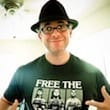By my count there have been four documentaries made about the West Memphis Three. All seek to convince the kind of people who watch documentaries that Damien Echols, Jason Baldwin, and Jessie Misskelley are innocent of the triple homicide for which they were twice convicted.
The first film, Paradise Lost: The Child Murders at Robin Hood Hills, by directors Joe Berlinger and Bruce Sinofsky, alleged that the WM3 were singled out by a hick, superstitious justice system because the crime appeared ritualistic in nature and Echols and his sidekicks had a fondness for the occult.
The sequel, Paradise Lost 2: Revelations, hoped to pin the murders of the three prepubescent boys on one of the victim’s stepfathers. The film did a fairly convincing job of it. Mark Byers was not only hounded and smeared by the filmmakers, for years he was unable to leave his home without townsfolk attacking him verbally and physically.
Fortunately for Byers another filmmaker has come along to clear his name.
In West of Memphis, by director Amy Berg, a new suspect has emerged. He is Terry Hobbs, the stepfather of yet another victim. The evidence against Hobbs is spotty at best: a bit of hair found on the shoelace used to hogtie one of the victims, a neighbor’s allegation that Hobbs was the last person to see the three boys alive (an accusation he denies), and some old criminal records which show Hobbs to have been a wife-beater. Of course if all West Memphis wife-beaters were suspects that would put half the adult male population under suspicion. The Arkansas police do not consider Hobbs a suspect. But what do those rubes know?
Besides these rash accusations, we see the filmmakers’ repeated attempts to trick Hobbs into admitting his guilt. Ty Burr of the Boston Globe concludes:
There are moments where the filmmakers overstep the bounds of documentary ethics and start creating drama rather than capturing it. A scene where Hobbs’s alibi, David Jacoby, tries to get his former friend to confess over the telephone plays like ghoulishly suspenseful entrapment…
The third stepfather, Todd Moore, has yet to be accused of triple murder by a Hollywood filmmaker. Perhaps his time will come in Atom Egoyan’s dramatized feature film of the case, Devil’s Knot, scheduled for release later this year. Meanwhile Moore wages a lonely campaign to remind Echol’s star-struck fans that the nascent film producer remains a convicted child killer who served 18 years for the murders before his all-star celebrity team won his release through a “bizarre legal contortion” that allowed the WM3 to plead guilty to triple homicide, but walk free with time served.
Writing in the Jonesboro Sun op-ed page, Moore notes:
The WM3 defense team has been well-funded by numerous celebrities who were misinformed by the biased “Paradise Lost” documentaries. These one-sided films left out nearly all of the evidence that demonstrated the guilt of the WM3. They caused thousands of people to support the release of the convicted child killers with a very limited understanding of the actual facts of the case.
YOU WOULD THINK that after accusing the wrong person in Paradise Lost 2, the filmmakers would think twice before pointing fingers. But then they have a hard task ahead of them. They need a boogeyman to take the heat off the West Memphis 3, so audiences will rush to take up their cause like all those cool celebrities, i.e., Eddy Vedder, Patty Smith, Johnny Depp, Henry Rollins, Peter Jackson, Natalie Maines, et al.
After four films, the public is left with more questions than answers. Were the boys sexually mutilated or eaten by turtles, as the fourth film suggests? Why did so many witnesses lie on the stand only to recant years later after the WM3 went from evil incarnate to cause célèbres? Why didn’t the filmmakers go into the WM3’s alibis? Why would Misskelley confess three (or was it five?) times to a murder he didn’t commit?
West of Memphis makes Al Gore’s An Inconvenient Truth seem fair and balanced. Perhaps that’s to be expected of a film co-produced by Damien Echols and his jailhouse bride. Since his release Echols has moved to Salem, MA, a town known for its famous witch trials. No doubt this is Echols’ not so very subtle statement about his own trial. Or maybe he just likes the vibe there.























